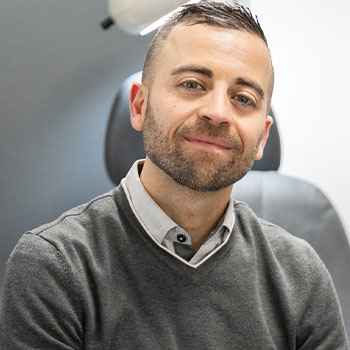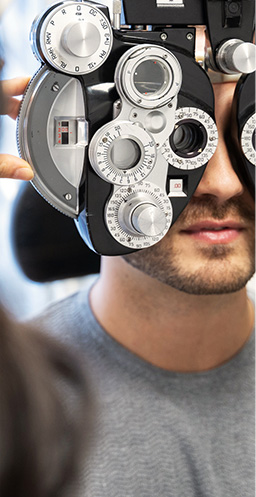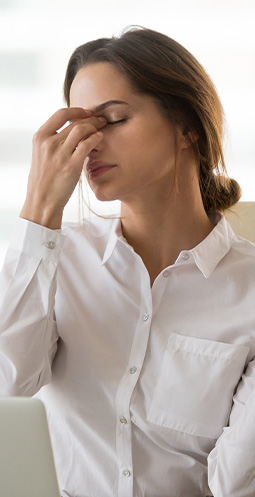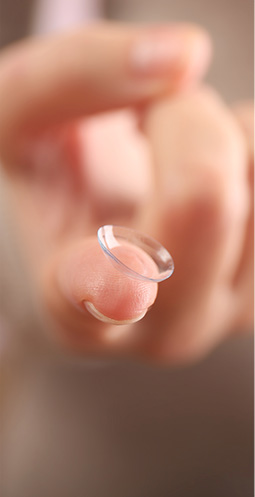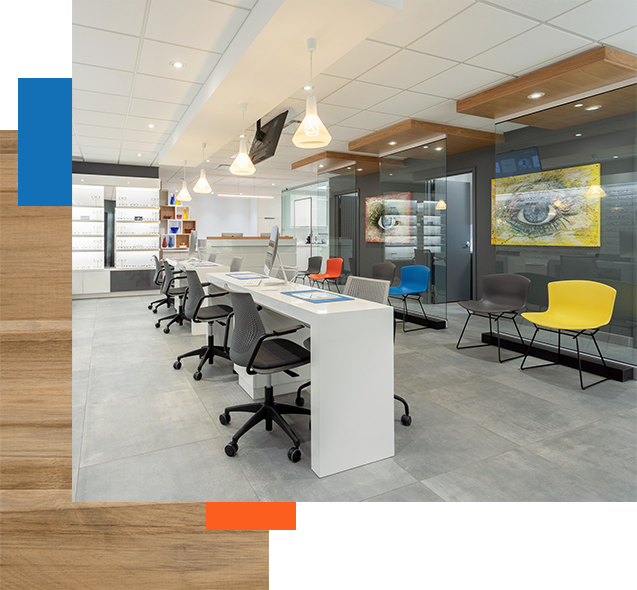Using Glasses Will Worsen Your Vision
While your vision can worsen over time, it’s not because of glasses. Many children need glasses because of myopia. It’s common for myopia to worsen as children age, but the progression of myopia is not due to glasses. Myopia can worsen as the eye continues to grow.
In adulthood, many people experience problems with reading and other near vision tasks as they reach their mid-40’s. This is due to presbyopia, or the stiffening of the eye’s lens. Reading glasses or multifocal lenses can correct presbyopia, but it often still progresses overtime. Many people need to update their prescription every 2 to 3 years from age 40 to age 60. The need to update your lens strength isn’t due to wearing glasses, however, it’s due to the natural ageing of your eye’s lens.
There’s also the chance that it could be due to your perception; you’re used to seeing well with your glasses so when you take them off, your vision seems to have gotten worse. All this to say, no, wearing glasses will not make your vision worse. Even glasses with the wrong or too strong of a prescription won’t damage your vision, but they could cause a headache.
Eating Carrots Can Improve Your Vision
A well-balanced diet rich in nutrients is good for your overall health, including your eye health. Carrots definitely won’t reverse vision problems, but they do contain nutrients that can contribute to good vision. Vitamin A is an essential nutrient for good vision that is found in carrots and it can help with night vision. Too little vitamin A can lead to blindness but eating lots of carrots won’t dramatically improve your vision.
It’s rumoured that the carrot myth was created by the British Royal Air Force in WWII to conceal radar technology. Instead of revealing their new radar capabilities, they simply boasted that their personnel ate carrots to improve their vision.
Whatever the origin, this myth is untrue. A number of foods and nutrients are important to good vision. Rather than focusing on one specific food, incorporate a variety of fruits and veggies into your diet for optimal eye health.
Contact Lenses & Laser Surgery Aren’t for People with Dry Eye
Contact Lenses
Both contact lenses and laser surgery have come a long way since they were introduced and today, many options exist for people with dry eye. With the right contact lenses and care, even those with dry eye should be able to wear contact lenses.
Depending on your level of dry eye, soft, hydrogel lenses may be comfortable. Daily lenses may help as well, as changing the lenses daily prevents deposits from building up, which can make your eyes feel dry.
For severely dry eyes, scleral lenses may work. Scleral lenses rest on the white of the eye (the sclera) and hover over the cornea. The unique fit creates a fluid reservoir between the contact lens and your cornea, helping your eyes retain moisture. An optometrist can determine what contact lenses are best for you during a contact lens exam and fitting.
Laser Eye Surgery
When it comes to laser surgery, dry eye is not an uncommon symptom after surgery. However, laser eye surgery like LASIK is possible in patients in dry eye with the proper post-surgery care. A laser surgery consultation with an optometrist can determine the best laser surgery options for you.
Reading in Low Light Will Damage Your Eyes
Reading in low light won’t damage your eyes or worsen your vision. In fact, reading in low light is what humans have done for much of history. Before electricity, people would read by dim light or candlelight. Even though most people today are used to reading in much brighter light, it won’t harm your eyes any more than it harmed our ancestor’s eyes.
Reading in poor light can cause eye strain, however. Lack of light can cause our eyes to work harder and they can get tired just like any other muscle. If you notice eye strain or discomfort after reading in low light, it’s probably better to turn another light on.
The Eye is Its Full Size at Birth
Baby’s eyes might seem disproportionately large, but just like the rest of the body, eyes continue to grow as we age. At birth, eyes are only about a third of their final size. The eyes grow considerably during our first 2 years of life and also grow significantly in adolescence.
Continued eye growth is actually why some conditions, like myopia, can continue to worsen as children grow older. As they grow, their eyes continue to grow, which can cause myopia to progress. In many cases, myopia can worsen until about age 20 or 21, which is when our eyes stop growing.
Sitting Too Close to the TV Will Damage Your Eyes
Sitting too close to the TV won’t damage your eyes or your children’s eyes. Many children prefer to sit close to the television as their eyes are better at viewing objects up close. If you notice your child consistently having trouble seeing things from far away, it could be a sign of vision problems. An eye exam is the best way to know if your child needs glasses, or if they simply prefer sitting closer to the TV.
Using Digital Devices Will Damage Your Eyes
Digital devices won’t damage your eyes, but research indicates that they contribute to myopia in children. However, a high amount of close work is likely the culprit, not digital screens. Any degree of close work, whether it’s from a tablet or a book, can contribute to eye strain and ultimately myopia.
Digital Eye Strain
While digital devices won’t damage your eyes, they can contribute to digital eye strain. Dry eye and headaches are common symptoms of digital eye strain. Like any aspect of your life, balance is important. If you work on a screen all day, it’s not a bad idea to take a break once you’re home. Regular breaks while you’re working can help too. Try taking a break every 20 minutes to look at something 20 feet away for at least 20 seconds.
Eye Exams Are Only Necessary If You Have Vision Problems
While you should always visit your optometrist if you’re having a vision problem, eye exams are something you should have regularly. Eye exams are preventative care for your eyes and help to detect eye disease and other eye health problems as early as possible.
Even if you have 20/20 vision, there could still be underlying health issues with your eyes. Night vision, colour vision, and peripheral vision are all important parts of eye health that are not measured on the 20/20 scale. 20/20 vision only measures central vision and does not measure other markers of eye health like intraocular pressure, for example.
If it’s been a while since you’ve visited the optometrist, book an appointment at Stoney Creek Eye Care. We’ll be happy to assess your eye health and answer any eye health questions you may have.



